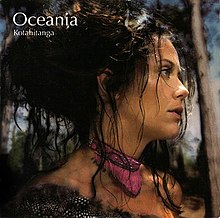| "Kotahitanga" | ||||
|---|---|---|---|---|
 | ||||
| Single by Oceania (Hinewehi Mohi and Jaz Coleman) | ||||
| from the album Oceania | ||||
| Language | Māori | |||
| Released | 1999 (1999) | |||
| Genre | ||||
| Length | 2:50 | |||
| Label | Point Music | |||
| Songwriter(s) | ||||
| Producer(s) | Jaz Coleman | |||
| Hinewehi Mohi singles chronology | ||||
| ||||
| Jaz Coleman singles chronology | ||||
| ||||
| Music video | ||||
| "Kotahitanga" on YouTube | ||||
"Kotahitanga" (English: "Unity"), is a song by Oceania, a musical act formed by New Zealand vocalist Hinewehi Mohi and English producer Jaz Coleman. A house remix of the song by Beatmasters was released as a single in New Zealand and Europe.
Background
Mohi debuted as a solo musician in the early 1990s. She met English producer Jaz Coleman of the band Killing Joke after he moved to New Zealand to become the composer-in-residence for the New Zealand Symphony Orchestra. Mohi, who was working as a television producer, sung at a tapu lifting ceremony for a recording studio, during which she impressed Coleman by her vocal ability. Mohi wrote the song together with Coleman. Mohi developed the chorus melody ("whaka awe, awe awe") first before developing the song in the studio with producers. She was inspired to create a song which would inspire the spirit.
The song has two versions featured on the group's debut album Oceania: one acoustic and one dance remix. The house remix of the song, produced by Beatmasters, was added to the record at the insistence of Mohi's record label in the United Kingdom, in order for the album to have a youth appeal. The remix was released as the leading single from the album in New Zealand and Europe. Mohi promoted the single in the United Kingdom in 1999, during which she shot a music video for the song in Epping Forest near London, redressed to look like New Zealand bush.
Mohi re-recorded the song in collaboration with the Auckland Chamber Orchestra in 2013, as a part of her album Raukatauri – Te Puhi o Te Tangi.
Composition
"Kotahitanga" is a song that blends Māori language lyrics, traditional melodies and taonga pūoro (traditional instruments) with modern house musical progression and structures. The lyrics discuss solidarity and freedom for the Māori people. The chorus lyrics are based around the repeating phrase "whaka awe, awe awe" ("be inspired"), and the bridge features a haka called "I Runga".
Reception and impact
While Mohi was in the United Kingdom, she was asked to perform the New Zealand National Anthem at the opening game of the 1999 Rugby World Cup. Mohi decided to sing the anthem in Māori instead of English, which received wide backlash in the New Zealand press at the time. During the World Cup, "Kotahitanga" was used as a song to promote and cheer on the All Blacks, and a special remix created for the event was featured on Land of My Fathers (1999), a promotional album of songs associated with the 1999 Rugby World Cup.
In a 2002 ranking by Mana magazine, "Kotahitanga" was the fifth most popular waiata chosen among Māori celebrities. The song was prominently used by the Jump Jam aerobics programme in New Zealand primary schools in the early 2000s, and was used as the opening theme of the 2000 Brazilian telenovela Uga-Uga.
Track listings
|
|
Credits and personnel
Credits for "Kotahitanga (Union) (7" Beatmasters Remix)" adapted from the "Kotahitanga" single.
- Beatmasters – producer
- Jaz Coleman – writer, producer
- Clive Goddard – engineer
- Hinewehi Mohi – lead vocalist, writer
References
- ^ "Making Music - Hinewehi Mohi". NZ On Screen. 2005. Retrieved 15 February 2022.
- ^ Nickson, Chris (15 June 2000). "Oceania Conjure Maori Sound with Log Drums, Electro Beats". MTV. Retrieved 15 February 2022.
- Reuters (6 October 1999). "UNITED KINGDOM: Maori group Oceania record music for World cup rugby competition". ScreenOcean. Retrieved 15 February 2022.
{{cite web}}:|author=has generic name (help) - Woulfe, Catherine (20 June 2010). "Music to heal by". Stuff. Retrieved 15 February 2022.
- "Hinewehi Mohi Releases Brand New Album". New Zealand Music Commission. 10 July 2013. Retrieved 1 May 2021.
- ^ Sheehan, Maree (2 February 2016). "Mana Wahine: Māori Women in Music". Te Kaharoa. 9 (1). doi:10.24135/tekaharoa.v9i1.12. ISSN 1178-6035. Retrieved 15 February 2022.
- ^ Sheehan, Maree (10 September 2021). "Songwriter's Choice: Maree Sheehan". Audio Culture. Retrieved 15 February 2022.
- ^ Archer, John (1 September 2002). "Kotahitanga". New Zealand Folk Song. Retrieved 15 February 2022.
- ^ "How the national anthem in Māori changed NZ". The New Zealand Herald. 7 April 2021. Retrieved 1 May 2021.
- "Oceania I". Hinewehi Mohi Official Website. Archived from the original on 14 October 2008. Retrieved 17 February 2022.
- "収録曲紹介" [Song explanations] (in Japanese). Universal Music Japan. Archived from the original on 8 April 2003. Retrieved 17 February 2022.
- "Land of my fathers [sound recording] : featuring Shirley Bassey, Michael Ball, Bryn Terfel, Ladysmith Black Mambazo". National Library. Retrieved 17 February 2022.
- McConnell, Glenn (7 June 2021). "Hinewehi Mohi, who performed the national anthem in te reo Māori, made a dame". Stuff. Retrieved 15 February 2022.
- "Uga Uga - Trilha Sonora". TV Globo (in Portuguese). Retrieved 23 March 2022.
- ^ Kotahitanga (booklet). Oceania. Point Music. 1999. 562 417-2.
{{cite AV media notes}}: CS1 maint: others in cite AV media (notes) (link) - Kotahitanga (booklet). Oceania. Point Music. 1999. 566 571-2.
{{cite AV media notes}}: CS1 maint: others in cite AV media (notes) (link) - Kotahitanga (The Eric Kupper Remixes) (booklet). Oceania. Decca Records. 2000. UCGR 00009-1.
{{cite AV media notes}}: CS1 maint: others in cite AV media (notes) (link)